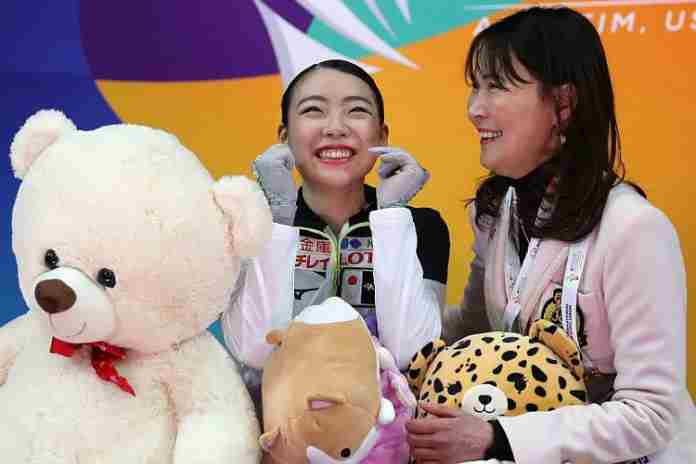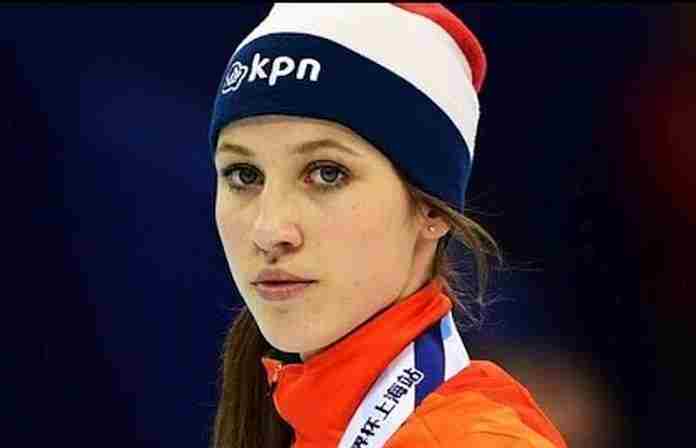Being in front after the Short Program was the wrong place to be at the ISU Four Continents Championships in Anaheim, California (USA). Every one of the first-day leaders faltered, and ended up second, third or worse.
The women’s programs were concluded first and Japan’s Rika Kihira, 16 and the winner of the Grand Prix Final in her first senior season, was fifth after the Short Program, trailing American Bradie Tennell, 73.91 to 68.85. But Kihira was terrific in the Free Skate, scoring 153.14 and dominating the event, way ahead of runner-up Mai Mihara (JPN: 141.97) and Elizabet Tursynbaeva (KAZ: 139.37); Tursynbaeva ended up second overall. Tennell was fifth in the Free Skate and ended up fifth.
Kihira said afterwards, “As for the [opening] triple Axel, I decided in the warm-up whether I would do one or two. I had not enough practice at the main rink and I decided to play it safe in the program and did only one triple Axel. In the practice rink this morning I tried as many triple Axels as possible. In the six minutes’ warm-up, [I] felt I need to focus, concentrate and just do it. The most important thing I learned from this competition is – no matter what happens never give up, keep going.”
It was fourth straight win by a Japanese skater in the Four Continents women’s division.
The men’s competition was just about as dramatic, as American Vincent Zhou won the Short Program at 100.18, ahead of Korea’s Junhwan Cha (97.33). But Olympic silver winner Shoma Uno was just as outstanding in the Free Skate as Kihira had been, racking up 197.36 points to 181.34 for Boyang Jin (CHN), with Zhou at 172.04 in fifth. That propelled Uno to the win, completing his three-year rise from bronze (2017) to silver (2018) to gold. Zhou managed to hold on to third.
Said Uno, “I don’t want to be caught up with rankings, but I am very happy with how I did with the program and to score first place. It was my first big medal at the senior level. For Worlds, I want to practice more and win the World title.”
Said Zhou, “I am very proud of myself at this competition for continuing the upward trend I put myself on. I’m looking forward to the next month of training for Worlds and to continue to improve the consistency.
“I expect myself to improve even more. I really want my skating to be something that everyone can enjoy, watch because they love watching good skating, freedom on the ice, and that’s what I hope to show at the Worlds and in competitions after that.”
The Pairs and Ice Dance events were much closer.
In Pairs, Canada’s Kirsten Moore-Towers and Michael Marinaro were ahead after the Short Program, but only by 0.47 over Olympic silver medalists Wenjing Sui and Cong Han (CHN). That was reversed in the Free Skate, as Sui and Han were superb and out-scored the Canadians by 136.92-136.39 and that was enough for a 211.11-211.05 win. A poorly-performed lift by Marinano might have been the difference.
For Sui and Han, it was their fifth Four Continents win and third in the last four years.
The Ice Dance leaders after the Rhythm Dance were, as expected, Madison Hubbell and Zach Donohue of the U.S., at 81.95 over teammates Madison Chock and Evan Bates (81.17). But the Free Dance was another story, as Hubbell and Donohue were penalized for an improper lift and fell to fourth at 119.91. Chock and Bates earned the highest Technical Element Score and ended up winning the Free Dance at 126.25, and the overall title. Their total score of 207.42 was well ahead of Canada’s Kaitlyn Weaver and Andrew Poje (203.93) and Hubbell and Donohue fell to fourth at 201.66.
For Chock and Bates, the win was a relief. They had been second at Four Continents in 2015-16 and third in 2013 and 2017. In Anaheim, they finally got a gold. Summaries:
ISU Four Continents Championships
Anaheim, California (USA) ~ 7-10 February 2019
(Full results here)
Men: 1. Shoma Uno (JPN), 289.12 (4+1); 2. Boyang Jin (CHN), 273.51 (3+2); 3. Vincent Zhou (USA), 272.22 (1+5); 4. Keegan Messing (CAN), 267.61 (5+3); 5. Jason Brown (USA), 258.89 (6+4); 6. Junhwan Cha (KOR), 255.83 (2+8); 7. Keiji Tanaka (JON), 251.54 (7+6); 8. Tomoki Hiwatashi (USA), 236.79 (9+7).
Women: 1. Rika Kihira (JPN), 221.99 (5+1); 2. Elizabet Tursynbaeva (KAZ), 207.46 (6+3); 3. Mai Mihara (JPN), 207.12 (8+2); 4. Kaori Sakamoto (JPN), 206.79 (2+4); 5. Bradie Tennell (USA), 202.07 (1+5). Also: 6. Mariah Bell (USA), 193.94 (3+6); … 11. Ting Cui (USA), 164.84 (7+14).
Pairs: 1. Wenjing Sui/Cong Han (CHN), 211.11 (2+1); 2. Kirsten Moore-Towers/Michael Marinaro (CAN), 211.05 (1+2); 3. Cheng Peng/Yang Jin (CHN), 205.42 (3+3); 4. Ashley Cain/Timothy LeDuc (USA), 196.82 (4+4); 5. Haven Denney/Brandon Frazier (USA), 184.18 (7+5). Also: 6. Tarah Kayne/Danny O’Shea (USA), 184.18 (7+5).
Ice Dance: 1. Madison Chock/Evan Bates (USA), 207.42 (2+1); 2. Kaitlyn Weaver/Andrew Poje (CAN), 203.93 (3+3); 3. Piper Gilles/Paul Poirier (CAN), 202.45 (4+2); 4. Madison Hubbell/Zachary Donohue (USA), 201.66 (1+4); 5. Kaitlin Hawayek/Jean-Luc Baker (USA), 189.87 (5+5); 6. Laurence Fournier Beaudry/Nikolai Sorenson (CAN), 186.91 (6+6); 7. Shiyue Wang/Xinyu Liu (CHN), 169.11 (7+7); 8. Hong Chen/Zhuoming Sun (CHN), 156.99 (8+8).

























